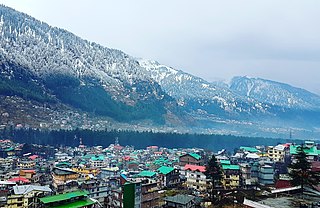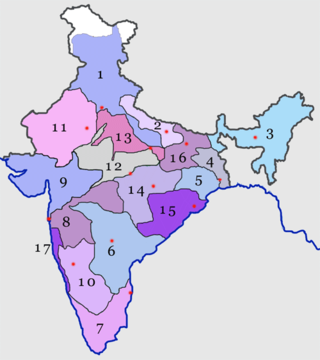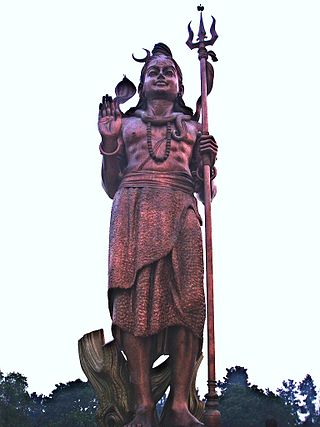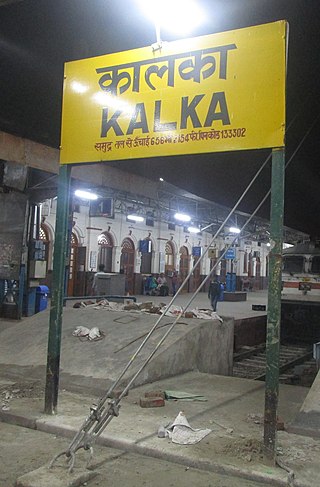
The 13th century was the century which lasted from January 1, 1201 (MCCI) through December 31, 1300 (MCCC) in accordance with the Julian calendar. The Mongol Empire, and some of its successor states such as the Ilkhanate, the Golden Horde and Yuan China were the most powerful and hegemonic states.

Year 1223 (MCCXXIII) was a common year starting on Sunday of the Julian calendar.
Blackwater or Black Water may refer to:
Kalka is a town in the Panchkula district of Haryana, India. It is near Panchkula city. The name of the town is derived from the Hindu goddess Kali. It is situated in the foothills of the Himalayas and is a gateway to the neighbouring state of Himachal Pradesh. It is on the National Highway 22 between Chandigarh and Shimla, and it is the terminus of the Kalka-Shimla Railway. To the south of Kalka is Pinjore, and the industrial village of Parwanoo is to the north on the NH 22. Railways and Industrial development has led to a continuous urban belt from Pinjore to Parwanoo, but Kalka gained major economic benefits due to only highway until 2010, shimla. It is the tehsil of 253 nearby sub villages. Nearby is Chandimandir Cantonment, where the Western Command of the Indian army is based. In 2013, the municipal committee of Kalka was dissolved and the administration was reassigned to Panchkula Municipal Corporation.

Manali is a town, near Kullu town in Kullu district in the Indian state of Himachal Pradesh. It is situated in the northern end of the Kullu Valley, formed by the Beas River. The town is located in the Kullu district, approximately 270 kilometres (170 mi) north of the state capital of Shimla and 544 kilometres (338 mi) northeast of the national capital of New Delhi. With a population of 8,096 people recorded in the 2011 Indian census Manali is the beginning of an ancient trade route through Lahaul (H.P) and Ladakh, over the Karakoram Pass and onto Yarkand and Hotan in the Tarim Basin of China. Manali is a popular tourist destination in India and serves as the gateway to the Lahaul and Spiti district as well as the city of Leh in Ladakh.

The Battle of the Kalka River was fought between the Mongol Empire, whose armies were led by Jebe and Subutai, and a coalition of several Rus' principalities, including Kiev and Halych, and the Cumans under Köten. They were under the joint command of Mstislav the Bold and Mstislav III of Kiev. The battle was fought on May 31, 1223 on the banks of the Kalka River in present-day Donetsk Oblast, Ukraine, and ended in a decisive Mongol victory.

The Northern Railway (NR) is one of the 19 Railway zones of India and the northernmost zone of the Indian Railways. It is headquartered at Baroda House in New Delhi.

Ambala is a city and a municipal corporation in Ambala district in the state of Haryana, India, located on the border with the Indian state of Punjab and in proximity to both states capital Chandigarh. Politically, Ambala has two sub-areas: Ambala Cantonment and Ambala City, eight kilometres apart, therefore it is also known as "Twin City". It has a large Indian Army and Indian Air Force presence within its cantonment area. It is located 200 km (124 mi) to the north of New Delhi, India's capital, and has been identified as a counter-magnet city for the National Capital Region to develop as an alternative center of growth to Delhi.

Pinjore is a town in Panchkula district in the Indian state of Haryana. This residential 'township', located close to Panchkula, Chandigarh, is set over 1,800 feet above the sea level in a valley, overlooking the Sivalik Hills. Pinjore is known for Pinjore Gardens, Asia's best 17th Century Mughal garden, and the Hindustan Machine Tools (HMT) factory.

Chandimandir Cantonment is a military cantonment of the Indian Army located in Panchkula district at the foot of the Sivalik Hills adjoining Panchkula city in Haryana. It is the headquarters of the Western Command of the Indian Army.

Hinduism is the majority religion in Delhi, India. According to the 2011 Census of India, the National Capital Territory of Delhi has 13,712,100 Hindus, who form 81.68% of the population. Hinduism can be extensively seen in culture and history of Delhi and was established by Hindu Tomara king, Anangpala. Though, the Hindus have seen some decline in the Delhi Sultanate and Mughal Empire, due to conversions and persecution. Delhi is also home to many Hindu temple and ashrams. There are more than 590 registered temples in Delhi, out of which Kalka, Birla, Akshardham and ISKCON Temple are the most visited.

Köten was a Cuman–Kipchak chieftain (khan) and military commander active in the mid-13th century. He forged an important alliance with the Kievan Rus' against the Mongols but was ultimately defeated by them at the Kalka River in 1223. After the Mongol victory, Köten led 40,000 "huts" to Hungary, where he became an ally of the Hungarian king and accepted Catholicism, but was nonetheless assassinated by the Hungarian nobility.

Siri Fort, in the city of New Delhi, was built during the rule of Alauddin Khalji, second ruler of Khalji Dynasty, of Delhi Sultanate to defend the city from the onslaught of the Mongols. It was the second of the seven cities of medieval Delhi built around 1303, which at present is seen only in ruins with a few remnants (pictured)

Kalka Mail is the oldest running train in India. This train connects Howrah in Kolkata, capital of the State of West Bengal to Kalka in the North-Western state of Haryana. Kalka is the railhead for the Kalka-Shimla Railway which connects to Shimla, the one time summer capital of the British Raj.

The Delhi–Kalka line is a railway line connecting Delhi and Kalka. It connects to the UNESCO World Heritage Site Kalka–Shimla Railway.











